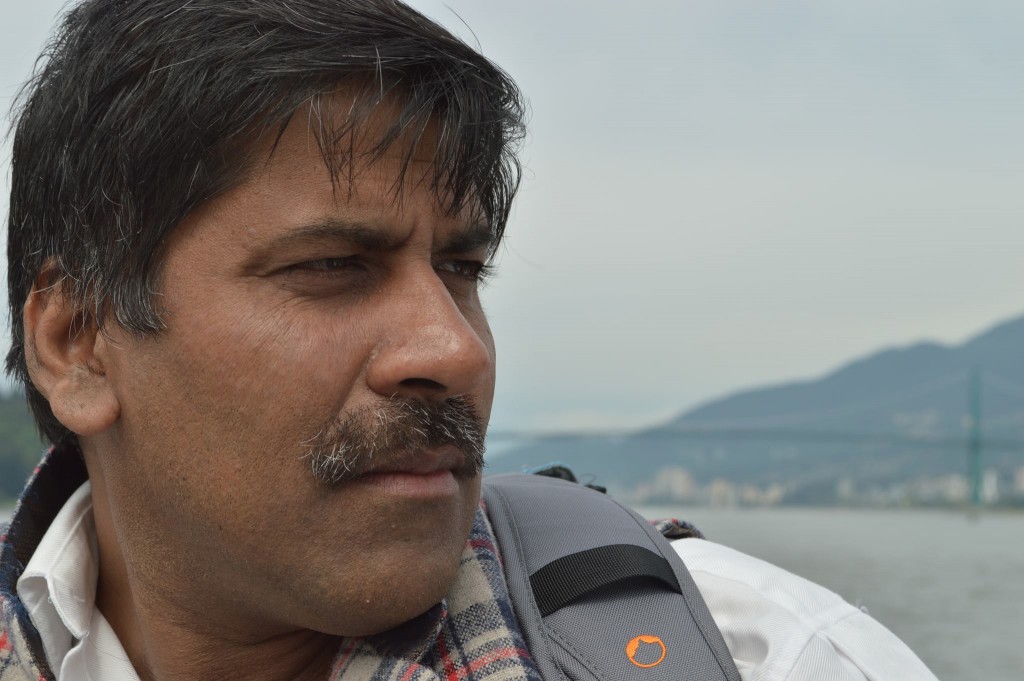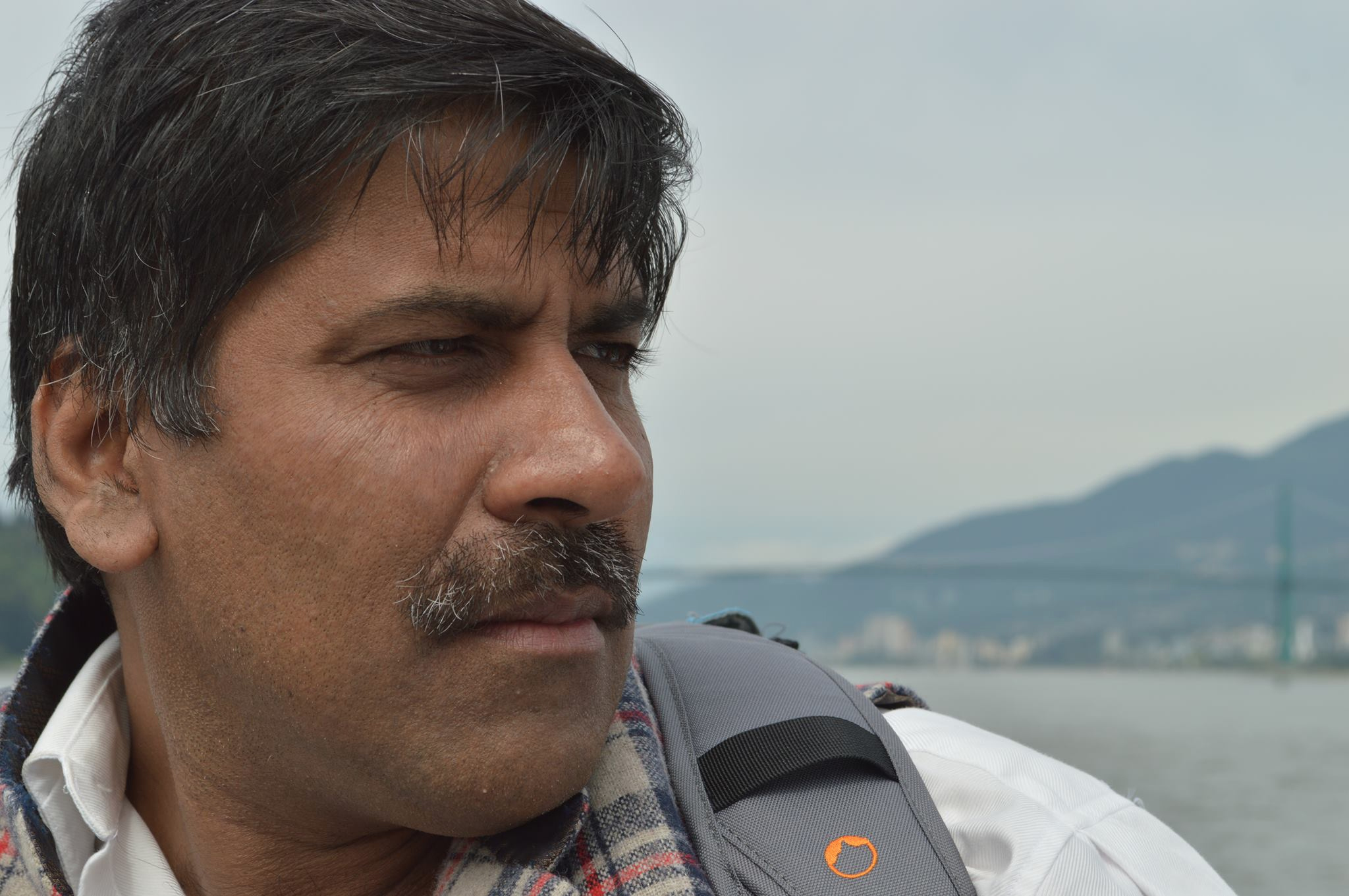By Jeffrey Trainor (The Cascade) – Email

Prof Talk is The Cascade’s oral history series, featuring the people best qualified to talk about what UFV has been like over the course of its first few decades: its professors. Each week we’ll interview a professor from a different department, asking them what UFV was like before it was UFV, and how they expect things will continue to change here.
Rajnish Dhawan is an English professor at UFV who specialises in drama and creative writing. Dhawan has taught at UFV for six years and has extensive experience in India teaching English.
What initially brought you to UFV?
Fate? [Laughs.] I came to Canada in 2009 and I was working in Edmonton. I saw a posting for a creative writing instructor, and then I called [UFV] and they said that post had been “filled up, but still send your resume.” So I sent my resume. There was one course they were really looking for someone to teach, which was an intro to drama course, and I had a little interview, and they offered it to me. At the same time, I was offered two courses at Grant McEwan University in Edmonton, so it was either less money and better weather, or more money and terrible weather. So the new immigrant in me said, “You know what? -40 degrees is too much. Forget the money, go to the valley.” I will credit John Carroll for that. I remained a sessional for about two years, then someone resigned, and there was an opening. I was hired as a regular in 2011, so I’ve been here for six years.
So that was a big change, coming from India to here?
I have been teaching at the post-secondary level since 1997, so I had 11 years of experience before I came here. When you’re new here, you’re looking for a survival job, and radio became that. I actually still do radio here on CIVL Radio; I do a show now which is actually the first Hindi show CIVL Radio has produced. It’s a chat / talk show with music. I’ve done radio here with John Carroll as well; it was a comical, satirical show called, “We have the WMD.” It ran for a season then we ran out of steam, but yeah — that’s how it started.
When you started at UFV you were just teaching intro to drama; was that a class you were really interested in?
Oh of course. That was actually one of the reasons I took this position, other than the weather. Grant McEwan University was giving me sort of English 105 courses. My PhD is in drama, [and] I wanted my first teaching experience here to be in my field of specialization, and I knew I would enjoy this more than teaching any other course. The next semester, I added on creative writing, South Asian literature, and after that, classical literature and Homer. The range keeps getting broader and broader.
So as I said, my PhD is in classical dramatic theory, the study of Greek and Sanskrit, so that makes me a classicist. But I like drama in all forms that encompass creative writing, and South Asian studies are also natural to me, so that fits in pretty well.
Since you started at UFV in 2009, what are some of the major changes you’ve noticed within the university?
It’s expanded. And in terms of the major change, which I still think has a lot more potential to grow, is the level of student engagement. It has grown over the six years I’ve been here, but it is still nowhere near where it should be. It’s an encouraging trend, but it’s a speed I’m not really happy with. I try to do my part. I hate the commuter-campus style, I personally want to remove that tag; tear it off. I grew up in an environment where student engagement in campus activity was way higher, and I know that it is very valuable for you when you leave university. My theory is everyone has a transcript; it’s the other things that matter.
Have you noticed your teaching style change over the years, especially with the rise of technology?
Style, say at a subjective level, doesn’t change much. I like to engage students in discussion. I like to create a comfortable environment for discussion. In my first lecture I tell them nothing should hold them back from voicing their opinion, because if they can’t do that here, where can they? Even if it’s not popular, they should voice it and let the people respond to it with their own opinions — then we can reach consensus. If it’s not on the very politically-correct boundary, apologize in advance, and say it. This is the place where you can safely say something and learn from each other. That is one aspect of my style.
The other is entertainment: I don’t like bored faces. I try to make them as enjoyable as possible. Fortunately, the classes I teach are enjoyable — that helps. I started using technology that I never used in India. Sometimes we showed videos, but rarely.
I have taught online, but I’m not too dependent on it. I use it sparingly, like a little bit of a spice; it is not the actual dish! Generally, I feel the learning experience is more face-to-face, personal, and interactive. The more we engage, the better.
My students know that there are official office hours, but they know they can meet me wherever they find me. So if they find me in Tim Horton’s they can have a chat with me, or the SUB nowadays. I think that is important, which is another change that was missing in my early years at UFV. Students, even if I encouraged it, they found it difficult to have an informal chat with faculty, which I didn’t understand why that was.
What have you taken out of your time at UFV?
We have a wonderful department, which is one thing. This is my fourth job, but I’ve never had such a wonderful, collegial atmosphere, ever. It’s a comfortable place as well, it’s encouraging. I know there are always issues with bureaucracy, and government policies and such. But generally speaking, it’s been very comfortable to teach and research.
What research was that?
Well, last year I wrote a play, John Carroll directed it, and we had 26 volunteers from the university who performed on stage. Most of them students, but a couple faculty and staff members as well, and a couple people from the community also played roles. The photographs are still by the library. That event would not have been possible if there wasn’t unconditional support for an idea. To imagine a play with 31 characters and with no money to make it with, then three departments in the university coming together to help out, and then students jumping on the bandwagon, was great. That gives you so much confidence that you can pull off certain, unimaginable things.
Do you think this shows that student engagement is getting better here?
I feel that, I really feel that. It’s still at about 20 to 25 per cent, but when I came here it was like, five per cent. I would like to see 80 to 85 per cent. That trajectory is slow, but at least it’s a trajectory, and that is good to know. I’m hoping the U-District works out, and this commuter campus thing goes away. I don’t want to be associated with a commuter campus — I want to be associated with a campus that is alive, where people feel comfortable. I feel comfortable here. University should give you that feel-good factor, that feeling that this is my place. It’s not that, “My classes are done and I should get out of here as soon as possible.” It’s like, “Okay, my classes are done, but I still want to be here.” It’s a fun place to be, and it can be an even more fun place to be.
This interview has been edited for length and clarity.


